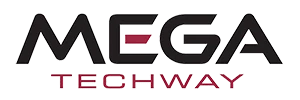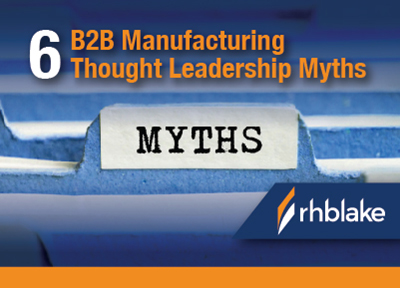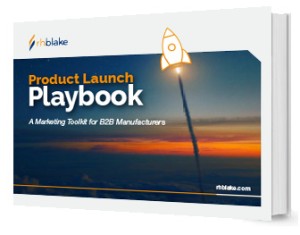What is Good Thought Leadership in the B2B Manufacturing Ecosystem?
When you hear the term “thought leadership,” what immediately springs to mind? Whitepapers? Research reports? That popular keynote speaker?
Good thought leadership is all about what you say, and how you say it, not the channel you use to say it. Yes, thought leadership enables manufacturers and suppliers to stand out, engage their target audience, and drive meaningful conversations. But what constitutes effective thought leadership, exactly?
At RH Blake, we help B2B manufacturers and companies that supply products and services to the B2B manufacturing ecosystem to become thought leaders. We’ve learned over the years that effective thought leadership comes down to eight essential ingredients. If you want to create and publish good thought leadership, ensure that it meets these eight requirements.
1. Original: Bringing Unique Perspectives to the Table
Thought leaders, by definition, are original thinkers. Effective thought leadership offers a fresh perspective or presents ideas in a way that hasn’t been explored by others. For manufacturing companies, this could mean presenting insights from proprietary research, sharing unconventional solutions to common challenges, or drawing on specialized knowledge from a unique industry vantage point.
When thought leaders bring original viewpoints, they differentiate themselves from competitors and demonstrate a deep understanding of the industry, attracting audiences looking for cutting-edge thinking.
2. Authoritative: Establishing Credibility Through Expertise
Authority is essential to effective thought leadership. Content from a recognized industry expert or reputable organization resonates more powerfully with an audience. For marketing managers in B2B manufacturing, promoting subject matter experts and senior executives enhances credibility. For instance, publishing insights from a chief engineer or a seasoned production manager who has decades of field experience makes content more compelling.
Authority is about the credibility that comes from industry expertise, and when thought leadership reflects this, it strengthens the audience’s trust in and engagement with your brand. And that often opens doors. As we reveal in our 2025 Thought Leadership in Manufacturing Report, 88% of decision-makers are more receptive to sales outreach from an organization that produces thought leadership content.
3. Impartial: Maintaining Objectivity and Neutrality
Unlike traditional marketing content, thought leadership is not about pushing a product or service. Instead, it presents an unbiased view that adds credibility to the company’s position as a reliable information source. Thought leadership avoids self-promotion (self-promotion turns readers away), and instead takes a neutral stance. By presenting balanced viewpoints, thought leadership content positions the organization as a trustworthy advisor.
This impartiality is essential for marketing managers in manufacturing, as it fosters long-term trust and allows the content to stand out from sales-driven messages. And the irony of impartial though-leadership content is that it promotes your brand. Our 2025 Thought Leadership in Manufacturing Report reveals that 92% of decision makers think more positively of organizations that consistently produce thought leadership content.
4. Realistic: Grounded in Real-World Applications
Manufacturing is a results-driven industry, and effective thought leadership resonates best when it includes real-world examples. Thought leadership that highlights successful case studies, lessons learned from challenges, or practical applications of innovative ideas becomes more relatable and credible.
By sharing these realistic examples, marketing managers demonstrate to their audience that the content is not merely theoretical, but rooted in genuine industry experience. This approach is particularly impactful in B2B manufacturing, where skeptical engineering audiences appreciate insights they can apply directly to their operations.
If your organization needs to position itself as a thought leader, let’s talk.
5. Empirical: Supported by Strong Data and Research
Credible thought leadership is evidence-based. It relies on research, data and empirical evidence. Manufacturing companies should leverage available data, such as industry reports, market research and proprietary studies to back up their insights. For marketing managers, presenting data-driven content not only supports the author’s assertions but also enhances credibility.
Incorporating data strengthens arguments and helps illustrate trends, impacts and potential outcomes in a concrete way. In an industry where decisions are often data-driven, empirical content resonates deeply and adds weight to the thought leader’s perspective and opinions.
6. Provocative: Challenging Conventional Wisdom
True thought leadership is not afraid to challenge the status quo. To be provocative means offering insights that push boundaries, question established practices, or encourage innovative thinking. For instance, a thought leader challenges common manufacturing practices or proposes disruptive technologies that change industry operations and norms.
By sparking curiosity and engaging readers in new ways of thinking, provocative thought leadership encourages B2B manufacturers to evolve, consider alternative strategies and stay ahead of competitors. One of those alternative strategies might be yours. In our research we’ve discovered that 84% of C-level executives purchase or start working with an organization that produces thought leadership content (see our 2025 Thought Leadership in Manufacturing Report).
7. Relevant: Addressing Today’s (and Tomorrow’s) Challenges
For thought leadership to be impactful, it must address current and emerging challenges. In the B2B manufacturing sector, these might include shifts in supply chain dynamics, new sustainability requirements, or the rapid advancement of AI-enabled automation. Where complex technology, regulatory challenges and evolving industry trends are the norm, thought leadership content should answer pressing questions, offer solutions, and demystify technical topics.
Marketing managers can add relevance by conducting surveys or gathering feedback on the issues that matter most to their audience. By focusing on pressing challenges, thought leaders position themselves as forward-thinking advisors who understand not only where the industry is today, but where it’s headed.
8. Declarative: Conveying a Clear and Persuasive Point of View
Thought leadership is more than just sharing information—it’s about guiding the audience’s thinking. Effective thought leadership communicates a decisive viewpoint, intending to shape the audience’s perspectives or to inspire action. Marketing managers in the B2B manufacturing space can use this declarative approach to advocate for best practices, promote industry standards, or encourage sustainable innovations.
The best thought-leadership content leaves readers with a changed mindset or a new appreciation for an issue. By being declarative, thought leaders become more than just contributors to a conversation. They become drivers of industry change.
Conclusion
Good thought leadership in the B2B manufacturing ecosystem is a carefully balanced mix of these eight essentials. It informs and educates, brings unique insights, is grounded in authority and research, and isn’t afraid to challenge conventions—all while addressing the current needs and future challenges of the industry. When B2B manufacturers and those selling to manufacturers embrace these principles, they establish their brands as trusted voices in the marketplace, creating lasting value for their audiences and setting themselves apart in a competitive landscape.

"“I’ve gotten all that I’d hoped for from the RH Blake Growth Roadmap™ and more. Based on the research and insights, we adjusted our offering scope and sales approach. And this adjustment has been effective at generating new opportunities."
 Diane Reko
Diane Reko
President
REKO International

"RH Blake has helped us define effective messaging strategies and supported us on multiple projects including product launches and customer awareness campaigns. I would recommend RH Blake for anyone needing marketing support. They are professional, responsive, easy to work with, and most of all effective."
 Mike Levesque
Mike Levesque
Global Product Group Communications Manager
ABB

"The RH Blake Growth Roadmap™ helped us validate and better understand how our customers think and make purchase decisions. It also enabled us to better inform our employees on the types of activities we perform that our customers find especially valuable."
 David Ortiz,
David Ortiz,
Vice President & Director of Business Development
MEGA TECHWAY Inc.

"RH Blake helped us know what we didn’t know in a way that enabled us to take what we learned and apply it to other parts of our business. Through the creation of their Growth Roadmap and Customer Journey Framework, we were able to better understand the buying habits and process of our catalog customers. Our research project with RH Blake is now helping us create more targeted, pinpointed marketing campaigns. We are on the path to success because of RH Blake's expertise and insight."
 Evan Blackwell
Evan Blackwell
Marketing Automation Supervisor
Walsworth

"For more than 15 years, RH Blake has been helping us develop successful business strategies and programs across multiple platforms to support our diverse marketing initiatives."
 Dennis Daniel,
Dennis Daniel,
Division Marketing Services Manager
Parker Hannifin





